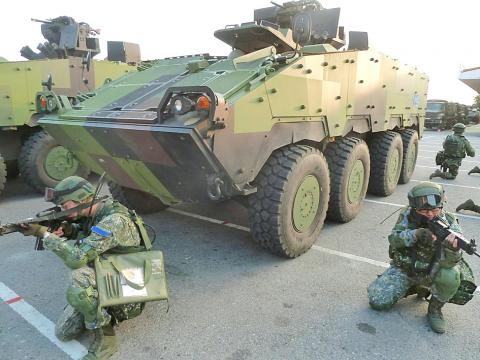Prototypes of an armored vehicle that the nation is developing have passed their tests and are soon to enter mass production, a military official said yesterday.
Four prototypes of the “Clouded Leopard” eight-wheeled armored vehicle passed the required tests on Friday last week, Army Lieutenant General Fang Mao-hung (房茂宏), head of the Armaments Bureau, told lawmakers.
The vehicles, officially called the Taiwan Infantry Fighting Vehicle (TIFV), have passed all 62 categories in the primary pre-mass production tests while failing only two categories in the secondary pre-mass production tests, Fang said.

Photo courtesy of the Army Command Headquarters
Because the test results have met the required standards, the military has initiated mass production of the vehicle — a variant of the CM-32 Clouded Leopard — equipped with a 30mm chain gun, he said.
A total of 284 vehicles are expected to be made in the coming years, Fang said, without elaborating.
A military official said that Taiwan has ordered Orbital ATK 30mm Mk44 Bushmaster II cannons to be mounted on the armored vehicle.
Compared with the CM-32 models that are armed with 40mm automatic grenade launchers, the 30mm cannon offers better anti-tank capabilities and precision firing of several rounds in rapid succession, the source said on condition of anonymity because the person was not authorized to comment on the issue publicly.
Asked if mass production of the CM-32 variant would affect the nation’s plan to buy M1A2 tanks from the US, Army General Yang Hai-ming (楊海明) said it would not, because the new prototype and the M1A2 are complementary.
The military in July announced plans to allocate NT$30 billion (US$969.4 million) to procure 108 M1A2 tanks from the US to replace its aging battle tanks.
Whether the US would approve the arms procurement request is still uncertain.

Chinese Nationalist Party (KMT) Chairman Eric Chu (朱立倫), spokeswoman Yang Chih-yu (楊智伃) and Legislator Hsieh Lung-chieh (謝龍介) would be summoned by police for questioning for leading an illegal assembly on Thursday evening last week, Minister of the Interior Liu Shyh-fang (劉世芳) said today. The three KMT officials led an assembly outside the Taipei City Prosecutors’ Office, a restricted area where public assembly is not allowed, protesting the questioning of several KMT staff and searches of KMT headquarters and offices in a recall petition forgery case. Chu, Yang and Hsieh are all suspected of contravening the Assembly and Parade Act (集會遊行法) by holding

PRAISE: Japanese visitor Takashi Kubota said the Taiwanese temple architecture images showcased in the AI Art Gallery were the most impressive displays he saw Taiwan does not have an official pavilion at the World Expo in Osaka, Japan, because of its diplomatic predicament, but the government-backed Tech World pavilion is drawing interest with its unique recreations of works by Taiwanese artists. The pavilion features an artificial intelligence (AI)-based art gallery showcasing works of famous Taiwanese artists from the Japanese colonial period using innovative technologies. Among its main simulated displays are Eastern gouache paintings by Chen Chin (陳進), Lin Yu-shan (林玉山) and Kuo Hsueh-hu (郭雪湖), who were the three young Taiwanese painters selected for the East Asian Painting exhibition in 1927. Gouache is a water-based

Taiwan would welcome the return of Honduras as a diplomatic ally if its next president decides to make such a move, Minister of Foreign Affairs Lin Chia-lung (林佳龍) said yesterday. “Of course, we would welcome Honduras if they want to restore diplomatic ties with Taiwan after their elections,” Lin said at a meeting of the legislature’s Foreign Affairs and National Defense Committee, when asked to comment on statements made by two of the three Honduran presidential candidates during the presidential campaign in the Central American country. Taiwan is paying close attention to the region as a whole in the wake of a

OFF-TARGET: More than 30,000 participants were expected to take part in the Games next month, but only 6,550 foreign and 19,400 Taiwanese athletes have registered Taipei city councilors yesterday blasted the organizers of next month’s World Masters Games over sudden timetable and venue changes, which they said have caused thousands of participants to back out of the international sporting event, among other organizational issues. They also cited visa delays and political interference by China as reasons many foreign athletes are requesting refunds for the event, to be held from May 17 to 30. Jointly organized by the Taipei and New Taipei City governments, the games have been rocked by numerous controversies since preparations began in 2020. Taipei City Councilor Lin Yen-feng (林延鳳) said yesterday that new measures by